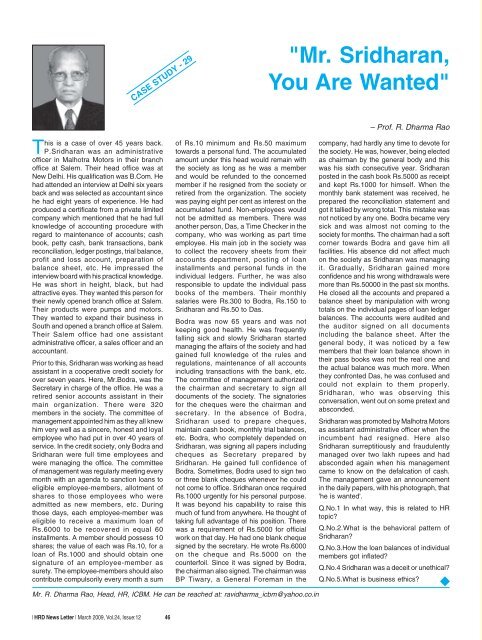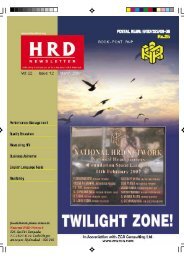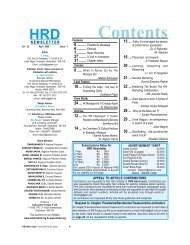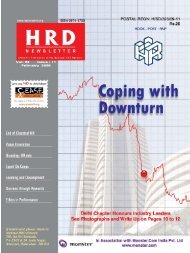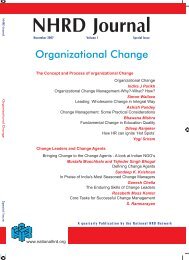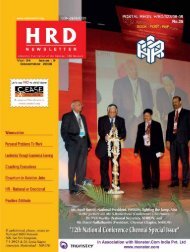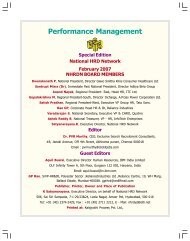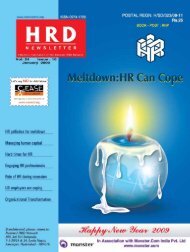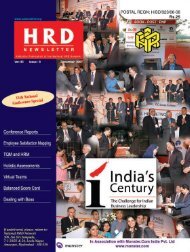delhi - National HRD Network
delhi - National HRD Network
delhi - National HRD Network
Create successful ePaper yourself
Turn your PDF publications into a flip-book with our unique Google optimized e-Paper software.
CASE STUDY - 29<br />
"Mr. Sridharan,<br />
You Are Wanted"<br />
This is a case of over 45 years back.<br />
P.Sridharan was an administrative<br />
officer in Malhotra Motors in their branch<br />
office at Salem. Their head office was at<br />
New Delhi. His qualification was B.Com. He<br />
had attended an interview at Delhi six years<br />
back and was selected as accountant since<br />
he had eight years of experience. He had<br />
produced a certificate from a private limited<br />
company which mentioned that he had full<br />
knowledge of accounting procedure with<br />
regard to maintenance of accounts; cash<br />
book, petty cash, bank transactions, bank<br />
reconciliation, ledger postings, trial balance,<br />
profit and loss account, preparation of<br />
balance sheet, etc. He impressed the<br />
interview board with his practical knowledge.<br />
He was short in height, black, but had<br />
attractive eyes. They wanted this person for<br />
their newly opened branch office at Salem.<br />
Their products were pumps and motors.<br />
They wanted to expand their business in<br />
South and opened a branch office at Salem.<br />
Their Salem office had one assistant<br />
administrative officer, a sales officer and an<br />
accountant.<br />
Prior to this, Sridharan was working as head<br />
assistant in a cooperative credit society for<br />
over seven years. Here, Mr.Bodra, was the<br />
Secretary in charge of the office. He was a<br />
retired senior accounts assistant in their<br />
main organization. There were 320<br />
members in the society. The committee of<br />
management appointed him as they all knew<br />
him very well as a sincere, honest and loyal<br />
employee who had put in over 40 years of<br />
service. In the credit society, only Bodra and<br />
Sridharan were full time employees and<br />
were managing the office. The committee<br />
of management was regularly meeting every<br />
month with an agenda to sanction loans to<br />
eligible employee-members, allotment of<br />
shares to those employees who were<br />
admitted as new members, etc. During<br />
those days, each employee-member was<br />
eligible to receive a maximum loan of<br />
Rs.6000 to be recovered in equal 60<br />
installments. A member should possess 10<br />
shares; the value of each was Rs.10, for a<br />
loan of Rs.1000 and should obtain one<br />
signature of an employee-member as<br />
surety. The employee-members should also<br />
contribute compulsorily every month a sum<br />
of Rs.10 minimum and Rs.50 maximum<br />
towards a personal fund. The accumulated<br />
amount under this head would remain with<br />
the society as long as he was a member<br />
and would be refunded to the concerned<br />
member if he resigned from the society or<br />
retired from the organization. The society<br />
was paying eight per cent as interest on the<br />
accumulated fund. Non-employees would<br />
not be admitted as members. There was<br />
another person, Das, a Time Checker in the<br />
company, who was working as part time<br />
employee. His main job in the society was<br />
to collect the recovery sheets from their<br />
accounts department, posting of loan<br />
installments and personal funds in the<br />
individual ledgers. Further, he was also<br />
responsible to update the individual pass<br />
books of the members. Their monthly<br />
salaries were Rs.300 to Bodra, Rs.150 to<br />
Sridharan and Rs.50 to Das.<br />
Bodra was now 65 years and was not<br />
keeping good health. He was frequently<br />
falling sick and slowly Sridharan started<br />
managing the affairs of the society and had<br />
gained full knowledge of the rules and<br />
regulations, maintenance of all accounts<br />
including transactions with the bank, etc.<br />
The committee of management authorized<br />
the chairman and secretary to sign all<br />
documents of the society. The signatories<br />
for the cheques were the chairman and<br />
secretary. In the absence of Bodra,<br />
Sridharan used to prepare cheques,<br />
maintain cash book, monthly trial balances,<br />
etc. Bodra, who completely depended on<br />
Sridharan, was signing all papers including<br />
cheques as Secretary prepared by<br />
Sridharan. He gained full confidence of<br />
Bodra. Sometimes, Bodra used to sign two<br />
or three blank cheques whenever he could<br />
not come to office. Sridharan once required<br />
Rs.1000 urgently for his personal purpose.<br />
It was beyond his capability to raise this<br />
much of fund from anywhere. He thought of<br />
taking full advantage of his position. There<br />
was a requirement of Rs.5000 for official<br />
work on that day. He had one blank cheque<br />
signed by the secretary. He wrote Rs.6000<br />
on the cheque and Rs.5000 on the<br />
counterfoil. Since it was signed by Bodra,<br />
the chairman also signed. The chairman was<br />
BP Tiwary, a General Foreman in the<br />
Mr. R. Dharma Rao, Head, HR, ICBM. He can be reached at: ravidharma_icbm@yahoo.co.in<br />
– Prof. R. Dharma Rao<br />
company, had hardly any time to devote for<br />
the society. He was, however, being elected<br />
as chairman by the general body and this<br />
was his sixth consecutive year. Sridharan<br />
posted in the cash book Rs.5000 as receipt<br />
and kept Rs.1000 for himself. When the<br />
monthly bank statement was received, he<br />
prepared the reconciliation statement and<br />
got it tallied by wrong total. This mistake was<br />
not noticed by any one. Bodra became very<br />
sick and was almost not coming to the<br />
society for months. The chairman had a soft<br />
corner towards Bodra and gave him all<br />
facilities. His absence did not affect much<br />
on the society as Sridharan was managing<br />
it. Gradually, Sridharan gained more<br />
confidence and his wrong withdrawals were<br />
more than Rs.50000 in the past six months.<br />
He closed all the accounts and prepared a<br />
balance sheet by manipulation with wrong<br />
totals on the individual pages of loan ledger<br />
balances. The accounts were audited and<br />
the auditor signed on all documents<br />
including the balance sheet. After the<br />
general body, it was noticed by a few<br />
members that their loan balance shown in<br />
their pass books was not the real one and<br />
the actual balance was much more. When<br />
they confronted Das, he was confused and<br />
could not explain to them properly.<br />
Sridharan, who was observing this<br />
conversation, went out on some pretext and<br />
absconded.<br />
Sridharan was promoted by Malhotra Motors<br />
as assistant administrative officer when the<br />
incumbent had resigned. Here also<br />
Sridharan surreptitiously and fraudulently<br />
managed over two lakh rupees and had<br />
absconded again when his management<br />
came to know on the defalcation of cash.<br />
The management gave an announcement<br />
in the daily papers, with his photograph, that<br />
'he is wanted'.<br />
Q.No.1 In what way, this is related to HR<br />
topic?<br />
Q.No.2.What is the behavioral pattern of<br />
Sridharan?<br />
Q.No.3.How the loan balances of individual<br />
members got inflated?<br />
Q.No.4 Sridharan was a deceit or unethical?<br />
Q.No.5.What is business ethics?<br />
<br />
| <strong>HRD</strong> News Letter | March 2009, Vol.24, Issue:12 46


